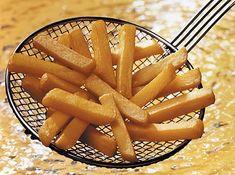
Potato bosses are warning against the demonisation of chips in the wake of the government's latest drive to improve school nutrition.
Following education secretary Ruth Kelly's new guidelines, the fried potato is to be blacklisted and heavily rationed, along with any other food item containing more than 10 per cent fat.
The widespread banning will be introduced as part of an initiative to phase out the current cafeteria-style set-up, in favour of a more structured menu, offering well-balanced meals.
The new regulations will be announced at the Labour Party conference later this month and introduced gradually, before becoming compulsory next autumn.
The guidelines have been agreed by the School Meals Review Panel set up by Kelly in response to concern over rising obesity levels and the furore raised by Jamie Oliver’s TV exposé of the poor state of school dinners.
Under the new guidelines schools will be set clear standards for permissible levels of carbohydrate, fat, salt and sugar.
Chips and other unhealthy favourites will not be banned altogether since nutritionists recognise this could alienate children from school services.
Instead, they will be branded "rare treats", appearing in canteens no more than once a week, rather than the current four-day feature operating in 76 per cent of schools.
Schools will also be instructed to produce chunkier-shaped chips which absorb less fat.
David Walker, Chairman of the British Potato Council (BPC), says the council is heavily involved in monitoring and promoting healthy eating but believes those drafting the regulations should be wary of demonising chips.
He said: “We welcome any initiative focusing on healthy, balanced eating, but actively challenge scapegoating or tokenism, particularly if this misrepresents the nutritional value of potatoes as a whole, or of chips in particular.
“Potatoes are unique in offering such a wide range of important nutrients and versatile cooking options, yet being so popular with children that they will choose them of their own freewill.
“It’s all too easy for sensational headlines to blur the fact that a 100g portion of oven chips contains less fat than 10 peanuts or a pot of yoghurt. Or that a portion of fish and chips has fewer calories, one-third less saturated fat and three-and-a-half times less salt than a cheese and tomato pizza."
Experts have warned that without major intervention a third of girls and a fifth of boys will be obese by 2020.
Meanwhile, several schools which have already introduced healthier menus have reported improvements in children's behaviour and performance.



